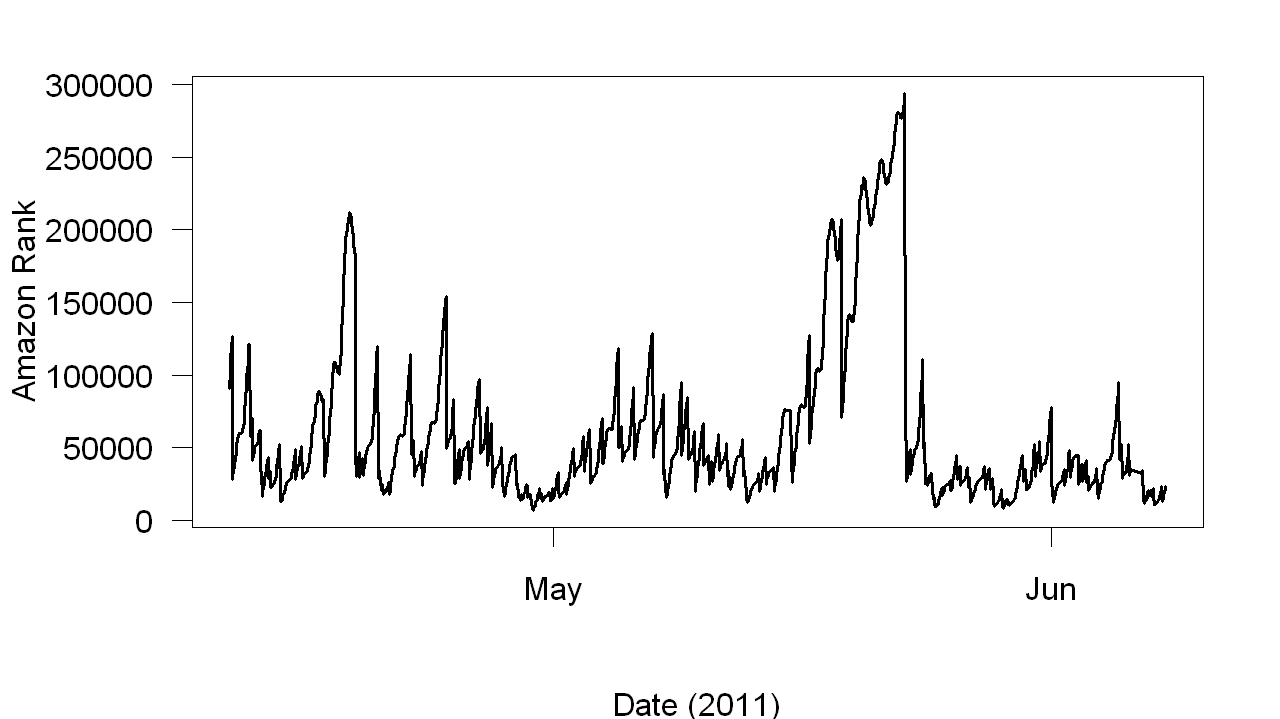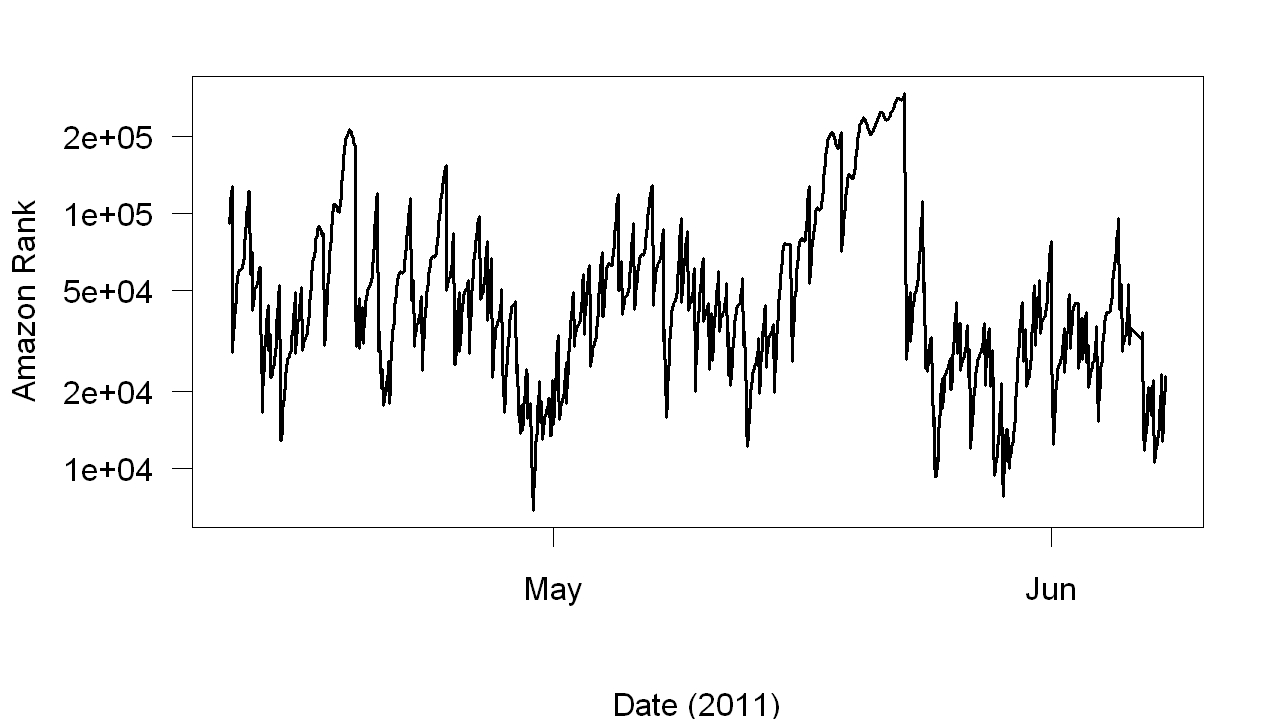For an article about self-experimentation and self-tracking to appear in Men’s Fitness UK this summer, Mark Bailey sent me several questions.
In what ways have the results of your self-experimentation directly affected your daily life e.g. health / work / lifestyle changes?
- Acne. My dermatologist prescribed two medicines. I found that one worked , the other didn’t.
- Weight. Found new ways to lose weight (e.g., nose-clipping).
- Sleep. Found new ways to sleep more deeply, avoid early awakening (e.g., one-legged standing).
- Mood, energy, serenity. Found that morning faces make me more cheerful, more energetic, and more serene.
- Productivity. After I started to track when I was working, I discovered that a certain feedback system made me work more, goof off less.
- Inflammation. Self-experimentation led me to take flaxseed oil. In the right dose — which I determined via self-experimentation — it greatly reduces inflammation. As a result, my gums are pink instead of red. They no longer bleed when I floss.
- Balance, reflexes. Flaxseed oil improved my balance and quickened my reflexes — I catch what I would have dropped.
- Blood sugar. I found that walking a lot improves my blood sugar level.
- Mental clarity. I found that flaxseed oil and butter improve how well my brain works in several ways.
Changes 1-6 are/were obvious. The rest are more subtle.
How long have you been self-experimenting?
About 35 years.
What are the main advantages of self-experimentation e.g. yields results specifically relevant to the individual and engages them directly in the process of finding solutions?
My self-experimentation has had three benefits:
1. Find new ways to improve health. Ways that no one knew about. I mentioned most of them earlier: New ways to lose weight, sleep better, be in a better mood, and so on. I find them to be much better (safer, cheaper, more powerful) than what was already available.
2. Test health claims made by others. I’ve done this many times. My interesting self-experimentation started when, as I said earlier, I measured the efficacy of two acne medicines my dermatologist had prescribed. I found that Treatment A worked and Treatment B did not worked, which was the opposite of what I had believed. It’s been claimed that drinking vinegar causes weight loss. I tried that, it didn’t work. Many people say that exercise improves sleep. I found that aerobic exercise made me fall asleep faster but did not reduce early awakening. The most dramatic “test” of health claims made by others came when I discovered that butter improved my arithmetic speed — which meant it was likely that butter improved overall brain function. I took this to mean that butter was good for the rest of the body — in contradiction to the official line that saturated fats are bad for us.
3. Find best “dose” of a treatment. Many people have claimed that flaxseed oil is beneficial. I found they were right. I tested different amounts/day and found the dosage that produced the most benefit. The best dose (2-3 tablespoons/day) was much larger than you would guess from the size of flaxseed oil capsules and the suggested dose on bottles of flaxseed oil capsules.
What do you consider are the potential weaknesses e.g. lack of clinical precision / possible placebo effect?
Is too-high expectations a weakness? You could spend a lot of time and not learn anything useful. Which isn’t so much a weakness as a fact of life.
In my experience, useful self-tracking and self-experimentation are slow. Other people’s self-tracking projects often strike me as too ambitious — doing too much too soon. For example, they are tracking too many things. Or worrying too much about placebo effects. Because they are doing too much — carrying too much, you could say — they may get tired and stop before they have learned something useful.
From a psychological perspective, why is the use of data / numbers, as in self-tracking, so much more powerful and engaging than merely ‘setting a goal’?
For one thing, it’s more forgiving. When I set goals for myself, I often fail to meet them. That can be so unpleasant I give up. When you simply measure something, it much easier to succeed — all you have to do is make the measurement. For another thing, it’s more informative. By studying my data I can learn what controls what I’m measuring (e.g., sleep). Setting a goal doesn’t do that.
Why, in a world dominated by numbers / statistics, has it taken so long for us to use data to learn about ourselves, our lives and our bodies?
You seem to be asking why has it taken so long to apply something so useful elsewhere (“numbers/statistics”) to ourselves? I have a different starting point. I think it is science — which is more than numbers and statistics — that has been useful elsewhere. Numbers/statistics by themselves are little help. I also think health scientists (e.g., med school professors) have used numbers/statistics to learn about ourselves — with little success.
In my experience, you need four things to make useful progress on health: 1. Good tools. Computer, numerical measurement. 2. Experiments. You need to systematically change things. 3. Knowledge of what others have learned. You can’t do experiments blindly, there are too many possibilities. You have to choose wisely what to change. 4. Motivation. You have to really care about finding something useful.
Professional scientists have Numbers 1-3 (tools, experiments, knowledge). Lacking Number 4 (motivation), they haven’t gotten very far. Self-trackers have Number 1 (tools). If they have a problem, something they want to improve, they have Number 4 (motivation). Most self-trackers have Numbers 1 and 4. Without Numbers 2 and 3 (experiment and knowledge) they aren’t going to get very far. What’s so important about the self-quantification movement is they might get Numbers 2 and 3. They might learn to experiment. They might learn to study what everyone else has already learned. When that happens, I think they will make a lot of progress. They will discover useful stuff that professional scientists have missed. And the whole world will benefit.
What developments will need to occur before self-tracking can really grow in the future e.g. better analysis / devices etc?
More successful examples. More examples where self-tracking led to improvement. They will teach everyone how to do it usefully. I think these examples will show that self-tracking alone is not nearly enough, as I said. But maybe I’m wrong. We need examples to find out.

